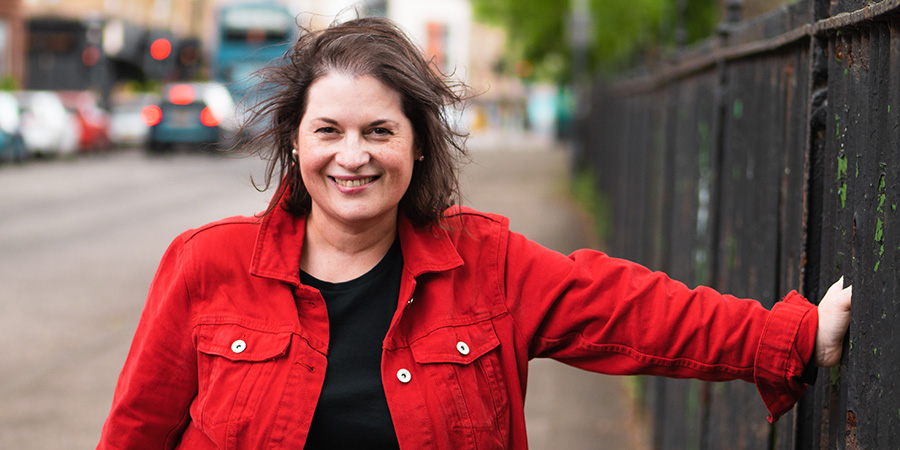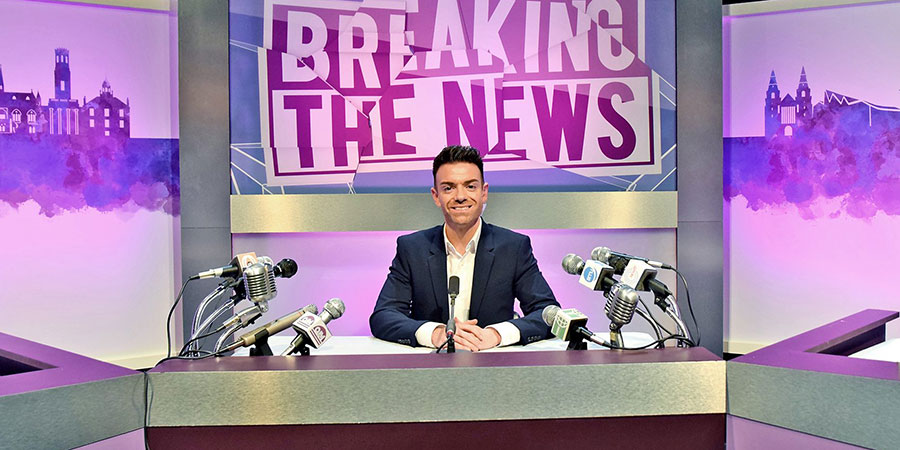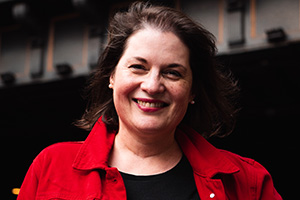Just an average Friday night, right?

Friday night. I'm sitting cross-legged in bed, munching a midnight feast off my fancy lap tray, channelling my inner duchess of Downton Abbey. I'm watching Breaking The News, BBC Scotland's satirical panel show, as it beams to TV audiences across Scotland. The panel's funny, and the host, Des Clarke, is introducing a segment on AI. He's setting up the punchline, and suddenly - wait, hold on, I know those words. He's saying my words!
The punchline lands, meep, the audience laughs, and I leap out of bed, my tea and toast flying up the wall. "That's my joke!" It's happening. My first-ever TV credit, and I've never been so excited in my entire life. I'm glued to the screen as the credits roll, and there it is: my name, clear as day - Lisa Houston, additional material. It's official. I'm in. I'm a professional writer on the BBC!
From lockdown novice to BBC contributor
I'm new to comedy writing. It all started during lockdown when, with nowhere to go and an overactive imagination, I decided to write a sitcom and submit it to a BBC comedy writing competition. I didn't make it past the first round (turns out I was a little too slow to "find the funny"), but the whole experience hooked me.
Then, a notification popped up in my inbox: a call for submissions to DMs Are Open. One of my strengths is my willingness to suck at something while I learn, so I committed. I met the deadlines and transcribed sketches from Monty Python to Catherine Tate and David Tennant's classic "You ain't even English, though!" from Comic Relief. I wanted to learn from the best.

Finding Breaking The News
Then I discovered Breaking The News. I reached out to the show's producer, Chris, who was incredibly welcoming and sent me my first brief. It felt surreal. Here I was, about to write for a real show! At the end of the first series, I asked for feedback. The production team's advice was a gift: they told me I had a unique perspective, but I needed to fine-tune my timing and tone to match the show. I soaked it up like a sponge.
Along the way, I joined Twitter and found the #BTN writing community. The writers were encouraging and unselfishly helpful. Even though technically we're all "competing" to get jokes in, it feels more like a collaboration to make the best show possible. There's no gatekeeping, just mutual support. The feeling of them reaching back and pulling me up is very real.
In my second series writing for Breaking The News, I landed two radio credits. By my third series, my work was on TV. My gags have made the script a few times, even if they didn't always make the final edit.
What I've learned (and what's next)
My biggest goal right now? Write tighter, land the funny faster, and nail down Des's voice. I'm also working on a sketch show and going back to the sitcom I started in lockdown. I've got a few BCG tutorials queued up to help polish my skills, and I can almost imagine a crowd of my writing community waggling foam fingers and shouting, "Go, Lisa! You're hilarious!". Perhaps I've lived alone too long...
But if you're out there, writing away, know that everyone's rooting for you. For anyone starting out, here are the three pieces of advice that have helped me the most:
1) Construct, confirm, confound
Build up expectations and then knock them sideways.
2) Read it out loud in the host's voice
My Scottish sons don't rate my attempt at the accent, but I give it a go.
3) Mark what grabs you on the brief
Go through it once, jot down initial ideas, then start drafting. Letting your first thoughts flow is key.
Getting that first TV credit is a moment I'll never forget, and I can't wait for what's next. I've got a ticket to watch the show recording on 14th November. I'll be laughing at your jokes and won't be holding a cup of tea in case one of my gags makes it through!
This article is provided for free as part of BCG Pro.
Subscribe now for exclusive features, insight, learning materials, opportunities and other tools for the British comedy industry.



